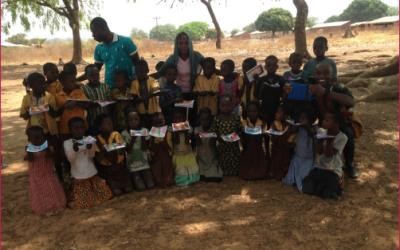Anytime I look at this picture, I see despair in a world that is supposed to give hope. I see a system designed to see innocent children struggle to reach the very pinnacle of their potentialities. I see a world that should up its game of providing literacy to every nook and cranny to ensure we have a thinking world.
“Children who read become adults who think”, a journalist captured it succinctly. Notwithstanding the above, I see how reading can provide hope to children born in abject penury to rise above their circumstances of birth and become meaningful citizens in a world that begs for responsible citizenship and participation. In the picture is myself with a young boy called Onikpel Bagri. The story is not what is stated above. How I got to know him and take this shot with him is the real story.
In 2015, we formed Success Book Club, a platform that develops literacy skills in the young people and also make large impact in their lives, communities and world at large.
One of our members is a young woman called Mardiya Suleman Cheiba who graduated from the Ghana Institute of Journalism and was posted to do her National Service in a remote area called Nsuanayili in the Northern Region of Ghana, a country in the West African sub-region.
She discovered a great deficiency of books and reading materials in the school under tree. She realized the squalor and indescribable level of deprivation in the school. She realized there is no way to teach the children in English because they could not speak English much more to even understand.
The children had this inferno of passion in them to learn yet their zeal is being crippled by the caricature of a school and the lack of learning materials. Mardiya could not speak their language yet did not leave them like that. She realized they needed help and instead of cursing the darkness, decided to light a candle. She returned to the city and we organized books, pencils, crayon, bags and other items really needed by the children and made a very tortuous and tiring journey to the village.
We presented these items to the school in the presence of the Schools Circuit Supervisor and the Headmaster. At the school a situation that has lingered in mind since. We met children very hopeful in face but wretchedness and pitiful was their situation. They were ready to learn, bare-footed, many without uniforms, some very small yet carried others to school. We met children of trials and tribulations.
Now this is where the story of Onikpel Bagri comes in to play. He was the brightest student in the school. Anytime we had a question to ask the children, it was Onikpel who translated it to them in their language before they gave us a response.
The headmaster claims that boy is the eye of the school. Unfortunately he finds himself crippled in a community that is sandy, dry and arid and could aptly be described as a desert.
The headmaster lamented the fact that these children come to school and have an almost nil concentration on studies because most come to school on a hungry belly. A lot have to walk back long distances during break time to eat and come back to school. Beyond the situation at the school is that of the community.
The community has no food store, no super-market, nothing. We had to buy sachet water in another village before we got there.
These are innocent children who have long been defeated by their circumstances in life; yet they are expected to compete with others born in Glasgow, Lisbon, Cairo, Accra, Washington in the global world we find ourselves in now.
These are the places charity organizations and philanthropists should channel their resources more to help revive the humanity in our brothers and sisters there. These are the people more deserving of help. We literacy actors must up our game. These are the people who need more programmes.
When we presented our literacy items to the school, the whole community acknowledged our gesture. They came out to welcome us. They brought in yams and other foodstuff just to show gratitude. The faces of the children beamed with smiles and happiness.
That literacy uplifts a people is not only true but it also gives hope. It gives hope that one day the child of the charcoal seller will also wear white shirt. It provides hope to the child that he or she can also reach wherever they want to reach through hardwork and diligence. We must channel resources into these communities and like to also be meaningful human beings.
One great African writer, Chinua Achebe sums it up for us. In his book The Trouble with Nigeria, he stated “These are the real victims of our callous system, the wretched of the earth. They are largely silent and invisible. They don’t appear on front pages; they do not initiate industrial actions. They drink bad water and suffer from all kinds of preventable diseases. There are no hospitals within reach of them; but even if there were they couldn’t afford to attend. There may be a school of sorts which their children go to when there is “free education” and withdraw from when levies are demanded. The politician may pay them a siren-visit once in four years and promise to give them this and that and the other. He never says that what he gives them is theirs in the first place. The things that are uppermost in their minds are basic, like clean water. The politician agrees; but there is financial constraint now. The plans are drawn by my government; water will be flowing by 1986. Meanwhile I give you the most modern television station in Africa. Surely this will make you smile.”










